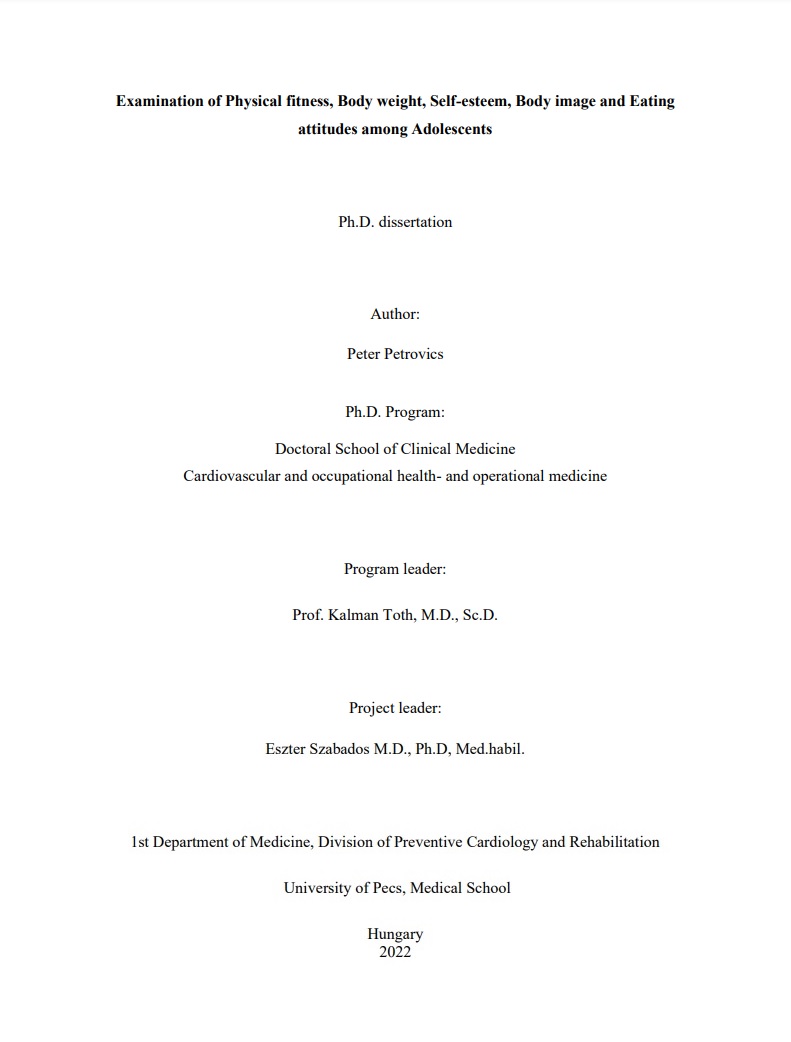Examination of Physical fitness, Body weight, Self-esteem, Body image and Eating attitudes among Adolescents
Abstract
Adolescence is a transition from childhood into young adulthood during which adolescents experience
physical, behavioral, cognitive, emotional, and social developmental changes. Adolescence is an
important period in a person’s life when main health behaviors can develop that may have a lifelong
impact. Puberty include rapid acceleration in physical growth, changes in body composition, metabolic
changes, brain development, psychological and sexual maturation, and changes in social role.
The worldwide prevalence of obesity among adults as well as in children and adolescents has markedly
increased over the past three decades leading to the so-called obesity epidemic. According to the latest
data in related literature, the presence of childhood and adolescent obesity, defined as a body mass index
(BMI) ≥ 95th percentile of the sex-specific BMI-for age, is as high as 18.5% in the USA, and 15% in
Europe. The prevalence of obesity in adolescence has stabilized at a high level in developed countries
but is still increasing in developing countries. In Hungary, according to a recent survey, in which 6824
children and adolescents (54 % boys), aged 3-18 years were examined, 14.1% of the boys and 12.6% of
the girls were found to be overweight, while 7.5% of the boys and 5.5% of the girls were obese. About
80% of obese adolescents remain in this condition as an adults. Adolescents with BMIs above the 85th
percentile are more likely to be obese by age 35 than their normal weight counterparts. Besides the many
short-term effects of obesity such as cardio-metabolic, respiratory, musculoskeletal, endocrine,
psychosocial effects, and increased cancer risk, a high percentage of children and adolescents track their
obesity into adulthood resulting in several chronic diseases and even premature death.
Better mental health during adolescence predicts better general health and fewer risky health behaviors
during young adulthood. Self-esteem (SE) is generally defined as the overall evaluation of oneself, and
interchangeably referred to as one's overall selfconcept or self-view. Lower self-esteem can be a causal
factor for depression, anxiety, eating disorders, high-risk behaviors, and social functioning. In
adolescence, a decline in the level of self-esteem can be observed, especially among girls. Additionally,
overweight, and obese adolescents frequently experience low SE.
Body image is determined by how individuals perceive or feel in relation to the size and outline of their
own body. It is well known that girls are more dissatisfied with their body image than boys in
adolescence. Body dissatisfaction may lead to adverse physical and mental health consequences,
including depression, anxiety, low self-esteem, and eating disorders.
Unhealthy eating attitudes and behaviors are quite common among young people, and overweight and
obesity imply a particularly high risk of developing such behaviors. The three most frequently studied
areas regarding eating attitudes are uncontrolled eating (UE), cognitive restraint (CR), and emotional
eating (EE). UE refers to an inclination to overeat, including the feeling of losing control. CR suggests
a tendency to consciously restrict food intake rather than using physiological cues (i.e., hunger and
satiety) as regulators of eating. Finally, emotional eaters tend to eat in response to emotional triggers
4
rather than real physiological needs. Emotional eating also implies or predicts weight gain and difficulty
of losing weight.
Better cardiorespiratory fitness has a positive effect in combating depression, anxiety, mood status, selfesteem, and is seemingly associated with higher performance in education.

